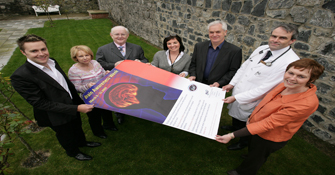This week is National Brain Awareness Week from the 7th – 13th of March and as part of this campaign, the Understanding Dementia Campaign has taken to the streets of Dublin. National Brain Awareness Week is an annual initiative co-ordinated by Neurological Alliance of Ireland; aimed at increasing public awareness of neurological conditions.
It has been estimated that in 2011, 47,849 people in Ireland were living with dementia and approximately 35 million people worldwide suffer from one or more types of dementias.
This week, volunteers have taken to the streets to educate and inform people about dementia. A common definition to describe dementia is the umbrella term used to describe a variety of syndromes characterised by changes in neural structure and cognition. It involves changes in the brain which has a knock-on effect on the way people think, feel and behave.
There are also a few common myths surrounding dementia, some of these include:
All dementias are the same
It’s completely hereditary (only some are)
It’s a normal part of aging (it is a neurological condition which may occur, but is not a part of normal aging)
Only older adults are affected (early onset can occur)
All memory loss = dementia (there is a difference between memory changes associated with aging and that of dementia).
The different types of dementia known to the medical world as Alzheimer’s Disease, Lewy-Body Dementia, Vascular Dementia, Fronto-Temporal Dementia’s, Creutzfeld-Jacob Dementia and Wernicke-Korsakoff’s Syndrome.
The general symptoms that are associated with dementia are: difficulty in remembering events; difficulty in performing everyday tasks; reduced concentration; changes in personality; changes in behaviour; lowness of mood; and confusion.
For a glimpse at the events programme this week go to: http://www.nai.ie/go/brain_awareness_week/events.
Statistics show that over 800,000 Irish people are affected by neurological conditions such as stroke, epilepsy, dementia, acquired brain injury and multiple sclerosis, and over 40, 000 Irish people are diagnosed with a neurological condition each year.
It is also a proven fact that Ireland has the lowest number of consultants in Europe to diagnose, treat and rehabilitate people with neurological conditions and that there are huge gaps in services in both hospitals and community nationwide, meaning that thousands of people struggle to get the care they need.









